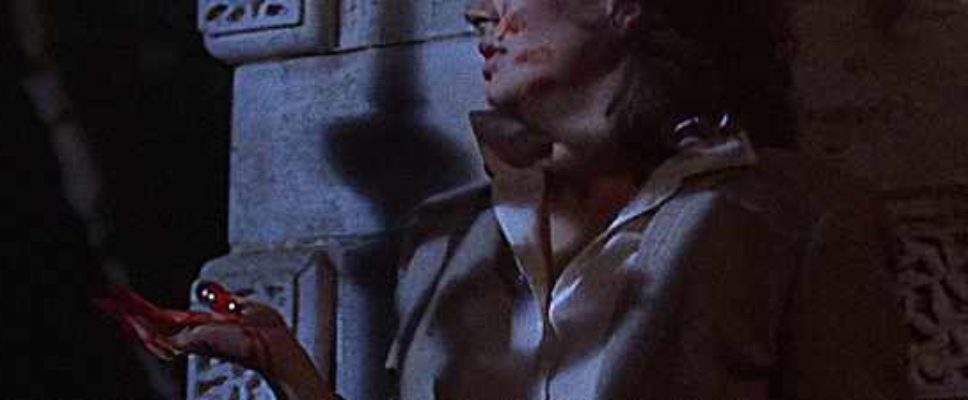Teresa Reviews “Murder Is Easy” (1982)
Teresa reviews “Murder Is Easy” (1982) and finds it a flat adaptation but a joy to watch great stars at work.
Fidelity to text: 4 murder weapons
 There’s some story compression, including vanishing the entire witchcraft subplot, character rewrites, and modernizing to the present, but otherwise, you’ll recognize the story.
There’s some story compression, including vanishing the entire witchcraft subplot, character rewrites, and modernizing to the present, but otherwise, you’ll recognize the story.
Quality of movie on its own: 3 murder weapons
 This should have been as poufy as Bill Bixby’s hair but instead, it’s flat.
This should have been as poufy as Bill Bixby’s hair but instead, it’s flat.
Read more of Teresa’s Agatha Christie movie reviews at Peschel Press.
Also, follow Teresa’s discussion of these movies on her podcast.

Our hero, Luke Williams (Bill Bixby from The Incredible Hulk!), is no longer an expat policeman from Malaysia. Instead, he’s an MIT computer scientist and mathematician on holiday in England. He’s still a bumbler; he misinterprets every clue, narrowly avoids getting the murderer’s disapproval, and is barely on time to save our heroine.
There’s a bizarre scene at Oxford with what was bleeding-edge computers of the time. Too bad the screenwriter had zero idea what programming them was like. The script made Bixby sound like an idiot. Even back then, viewers would have known better and today, it’s like watching him do the time warp from a bad science-fiction movie made in 1955. My own Bill, who did computer programming at that time, was appalled.

Despite moving the story from 1939 to the Reagan era, this version is remarkably faithful to the text. Miss Marple does not show up (see ITV’s unfortunate remake with Julia McKenzie), nor are entirely new subplots introduced to replace perfectly good existing ones. If anything, simplifying the plot made the movie more understandable. That’s a must when you have to tell a complex story involving seven separate murders — each committed differently! — and get it done in 90 minutes while remaining comprehensible.
Someday, we’ll get the good version of Murder Is Easy we’ve all been waiting for but this wasn’t it either. I’d like to see the midnight rituals Mr. Ellsworthy, antique dealer, conducts. I’d like to see Inspector Battle who shows up at the end in the novel but once again, alas, does not on film.
Bridget Conway remains true to herself. Born into wealth, she’s now a poor working girl. She’s happy to marry Lord Easterfield despite his age and character. She doesn’t want to be poor anymore and she’d like to return to being the Lady of the Manor. Luke has issues with her practical mindset but then, he did in the novel.
Even better, this Bridget has an actual romance with Luke although I did not like her falling into bed with him within a day of their meeting. I can’t stand how Hollywood forces actresses to behave like sluts.

I don’t. No one would. No, our Bridget would wait until after he put a ring on it. Then she’d conduct discreet affairs leading to sons that would bind them together permanently, keep the money flowing, and have her sons inherit the grand mansion and estate her family once owned.

Sadly, she never shares a scene with the movie’s other screen legend, Olivia de Havilland.

There are strong hints of the class divide in the quaint village. Lord Easterfield is a parvenue, an upstart, awarded his title because of his newspaper empire. He’s not that bright and more than one person in the village resents him taking over when Miss Waynflete and Miss Conway are higher on the social scale than he is. Miss Waynflete didn’t marry Lord Easterfield when they were young and his status as a tradesman’s son might have been behind her decision. Or so people think. She says differently to Luke, but I’m sure it was there. It couldn’t not have been.

Should you watch this film? It’s much truer to the text than ITV’s version which threw out most of Agatha’s characters and subplots. It lags when it should be energetic. But it’s got Olivia de Havilland and Helen Hayes (who went on to play Miss Marple twice) so probably. But don’t expect anything spectacular like Bill Bixby turning into the Hulk.

Read more of Teresa’s Agatha Christie movie reviews at Peschel Press.

